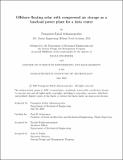Offshore floating solar with compressed air storage as a baseload power plant for a data center
Author(s)
Athanasopoulos, Panagiotis Rafail
DownloadThesis PDF (4.798Mb)
Advisor
Sclavounos, Paul D.
Terms of use
Metadata
Show full item recordAbstract
This thesis presents the conceptual design, technical modeling, and economic analysis of a novel offshore floating solar energy system integrated with Compressed Air Energy Storage (CAES) for reliable baseload power delivery to coastal data centers. The system architecture is modular, consisting of multiple “powercells,” each comprising a 5×5 photovoltaic (PV) array mounted above a matrix of submerged compressed air storage cylinders anchored below the floating platform, addressing the energy resilience and spatial constraints of coastal computing infrastructure. This scalable configuration enables distributed energy collection and localized storage, tailored to meet site-specific demands. Detailed thermodynamic modeling of both charging and discharging cycles is conducted, with analytical solutions validated against a full numerical implementation. Results show that under realistic operating assumptions, the temperature inside the storage vessels remains nearly isothermal due to the long charging duration and large heat exchange surface, enabling a simplified energy balance model.
A techno-economic analysis evaluates both structural steel requirements and photovoltaic investment, benchmarked against market data from 2024. Key metrics such as structural cost per unit energy ($/kWh) and per rated power output ($/kW) are derived. The hybrid system is found to be economically competitive with lithium-ion (Li-ion) battery alternatives, offering extended lifespan (20–30 years), lower material costs, and enhanced sustainability through avoidance of critical minerals. Environmental and mooring considerations for offshore deployment are also addressed, demonstrating the feasibility of integrating energy generation, storage, and maritime infrastructure. This work advances the development of resilient, decarbonized energy systems aligned with global renewable energy targets and the rising demand for sustainable data center operations.
Date issued
2025-05Department
Massachusetts Institute of Technology. Department of Mechanical Engineering; System Design and Management Program.Publisher
Massachusetts Institute of Technology